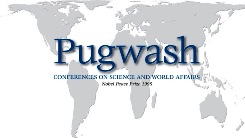By Jayantha Dhanapal and Paolo Cotta-Ramusino*
IDN-InDepth NewsDocument
As an emotional and political roller-coaster about Syria continues, some of the crucial facts and background are being ignored. So that these do not disappear completely from the radar, IDN is documenting the following statement issued on August 29 – Editor.
The Pugwash Conferences on Science and World Affairs considers the possession and the use of chemical weapons, as with all weapons of mass destruction, abhorrent. We join with Syrians and people worldwide in expressing our horror at the recent apparent use of some sort of chemical agent against children and other sleeping civilians in the Damascus suburbs.
The international norm against chemical weapons stretches back to the 1925 Geneva Protocol, which prohibits chemical weapons use. The 1997 Chemical Weapons Convention (CWC) has 189 parties, covering some 98% of the world’s population and 98% of the worldwide chemical industry. While Syria is not a party to the CWC, they have acceded to the Geneva Protocol, which renders criminal at least the first use of chemical weapons. The perpetrators of this crime deserve severe condemnation and punishment.
With the memory of 2003 with regard to the allegation of the existence of weapons of mass destruction in Iraq still fresh in our collective conscience, we are fortified in our belief that the agreed UN process should be permitted time for completion until the full facts are revealed.
UN weapons inspectors are on the ground to determine whether chemical weapons in fact have been used. The UN Secretary-General has asked for time for this team to do its work and for the results to be known. Loose talk among national leaders about a possible military strike while UN inspectors are on the ground is irresponsible and delegitimizes the hard-fought for UN process.
Should the UN team’s report confirm the suspected use of chemical weapons, the next step will be to ascertain if possible who was responsible for their use, and for the international community via the UN Security Council to agree on what action should be taken, including possibly by referring them to the ICC. It is precisely because there may be disagreements over an appropriate response among UNSC members that this dialogue is urgent and necessary.
Meanwhile, efforts to reach a negotiated settlement must not be derailed and all assistance must be given to special envoy Lakhdar Brahimi in his mission to convene the so-called “Geneva II” conference. The cancellation of a US-Russian meeting this week to plan for Geneva II raises concerns. In the end, there will need to be a negotiated solution. As a first step, an international consensus from Geneva II that violence will not solve the problem could be a step forward. Engaging Syrian civil society beyond the warlords is essential for the attainment of a peaceful future for the Syrian people.
Military intervention ill-advised
Without a peace process, military intervention will most likely deepen, expand, and prolong the conflict. More than 100,000 Syrians have lost their lives in this conflict, but some will galvanize around the Assad regime more concretely once foreign bombs are added to the mix.
Decisions made by some governments to take justice in their own hands are ill-advised and dangerous. Unilateral action can well spark off a new war in the Middle East and complicate the search for a political solution. Rather than strengthening the norm against CW use, these actions might undermine this norm and existing legal instruments and international investigative mechanisms.
Rather than a limited military intervention with unclear goals, a cessation of all war-related actions should be promoted, by engaging in an all-inclusive dialogue including the government of Syria, the representatives of opposition, the neighbouring countries (including Iran, Saudi Arabia), as well as NATO countries and Russia.
The universalization of the CWC and the dismantlement of CW stockpiles is a goal that needs to be prioritized and plans should be discussed for how to achieve a Syria free of chemical weapons following the cessation of the current conflict.
Events in Syria reinforce the urgent need for a Middle East WMD (weapons of mass detruction) Free Zone. The conference called for by the NPT Review Conference in 2010 for 2012 should be held with utmost urgency. Those countries who believe the use of military force is a viable option following an alleged attack, but who block efforts to convene meetings that could lead to the eradication of these weapons from regional arsenals, bear some responsibility for the deepening quagmire in the Middle East.
*Jayantha Dhanapal is President and Paolo Cotta-Ramusino Secretary General of the Pugwash Conferences on Science and World Affairs. [IDN-InDepthNews – August 30, 2013]
2013 IDN-InDepthNews | Analysis That Matters
Image credit: Pugwash Conferences on Science and World Affairs
Send your comment | Subscribe to IDN newsletter
Follow us on Twitter and Facebook:
http://twitter.com/InDepthNews
http://www.facebook.com/IDN.GoingDeeper

